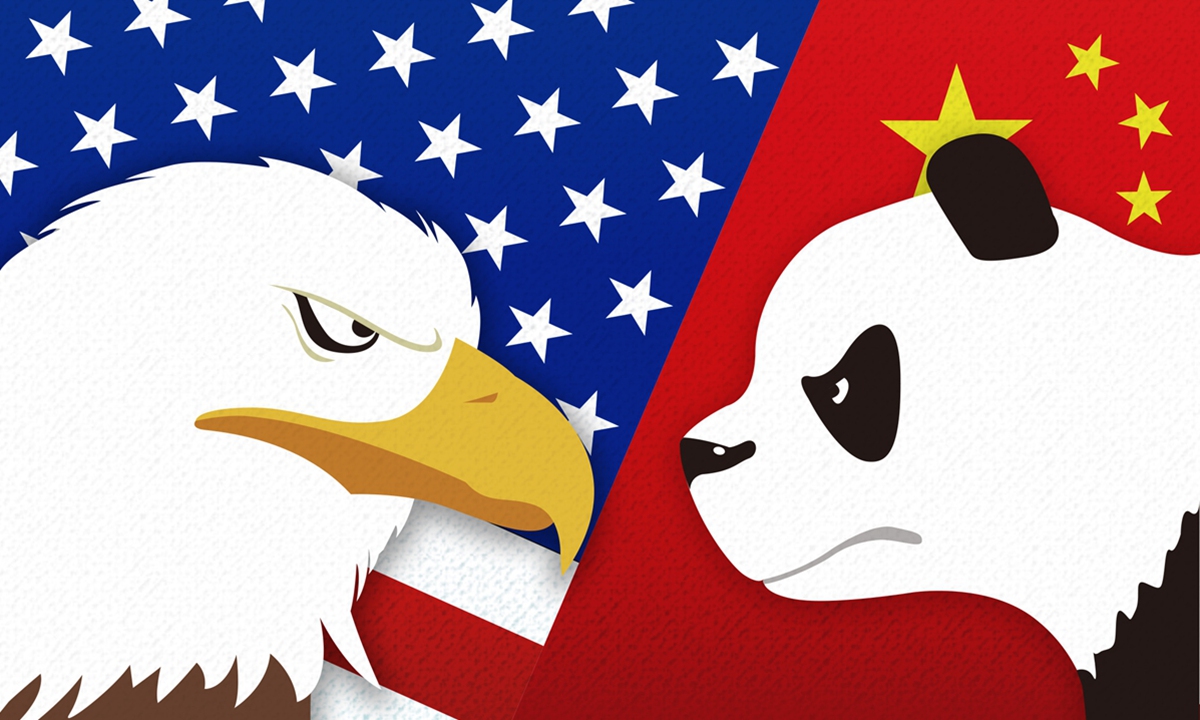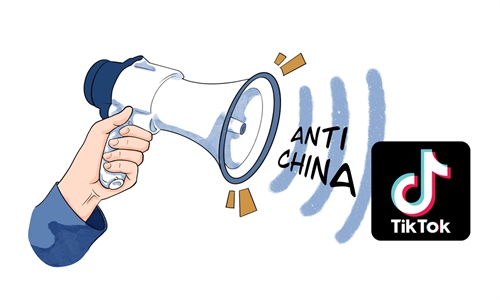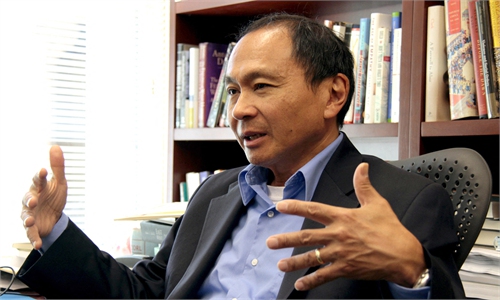
China US Illustration: Liu Rui
Editor's Note:The hysteria toward China has risen to a new peak in the US. Political climate in Washington is increasingly weird in terms of China-related topics. Why is there so much irrationality on China in the US? How to view China-US relations from a constructive perspective? The Global Times (GT) interviewed several Chinese and American observers on these topics.
Sourabh Gupta (Gupta), a senior fellow at the Washington-based Institute for China-America Studies, said that orchestrated hysteria and manipulation of perceptions is that (foul) weapon of choice to accelerate the tearing down of the edifice of stable and interdependent US-China relations. He said this irrationality of the US political establishment is in fact a coldly rational ploy.
GT: Recently, US Treasury Secretary Janet Yellen and Trade Representative Katherine Tai have repeatedly showed their hardline stances toward China. In comparison, the treasury secretary and trade representative of the Trump administration were relatively rational figures even when former president Donald Trump launched trade war toward China. What is your take about US' economic officials becoming super hawks?
Gupta: In the fevered geopolitical environment created by Russia's attack on Ukraine, it is true that Treasury Secretary Yellen and USTR Tai, hoping to politically profit from the democracies v. autocracies framing, have taken strongly hawkish positions on China. But these two cabinet officials are coming from very different places on China. Secretary Yellen is speaking from a position of strength, knowing that the 'shock and awe' financial sanctions imposed on Russia and its central bank have rocked many economic officials back on their heels in emerging markets, including in China (although China is better positioned to cope and has lesser reason to fear the sanctions than other non-Western countries). On the other hand, USTR Tai is speaking from a position of weakness, attempting to mask her failure to draw up a minimally intelligible China trade policy with hawkish bluster toward Beijing. Overall, though, once the hot phase of the Russia-Ukraine conflict is behind us, and also the US mid-term elections and the 20th CPC national congress this fall are over, I expect a modest change in tone and perhaps even in substance from US' key economic policy officials.
GT: US elites including politicians, officials and media persons are supposed to help foster the public's correct perceptions and understanding of China. But unfortunately, it seems they are competing for who is tougher on China. How come there is such a situation? Is the US political circle losing its rationality toward China?
Gupta: There is no question in my mind that the US political establishment has lost a fundamental element of rationality on coping with the China challenge. For a long time in fact, this questionable sense of rationality on China has bubbled beneath the surface within the Beltway but was tamped down by efficient bilateral management of the US-China relationship. With the callous, bordering on deliberate, mismanagement of the relationship by the Trump administration, the hounds of hysteria have been veritably unleashed within the Beltway and beyond, and President Joe Biden - whatever his personal inclinations on China might otherwise be - is politically incapable and unwilling to rein it in, at least for the time being.
This having been said, one should not underestimate the depth of Beltway-instigated orchestration of this hysteria. Great power competition trending towards conflict cannot be prosecuted if the great or major powers enjoy a stable and symbiotically interdependent relationship - which Beijing and Washington did enjoy through much of the first decade-and-a-half of the 21st century. The edifice of interdependence must be torn down first by means fair or foul. Orchestrated hysteria and manipulation of perceptions is that (foul) weapon of choice to accelerate the tearing down of the edifice of stable and interdependent US-China relations. At some level thus, this irrationality of the US political establishment - call it 'deep state' or whatever - is in fact a coldly rational ploy.
As for placing faith in officials and media to foster correct perceptions of China, I would gently suggest otherwise. Most are part of the problem; not the solution.
GT: Trade has been described as the "ballast stone" of China-US bilateral relations. The interdependence between China and the US is also the main reason why some believe that the Cold War cannot be repeated. Do you agree with that idea? Will trade continue to play the role of the ballast stone for China-US relations?
Gupta: Both, yes and no. Yes, trade was the ballast stone of the China-US bilateral relationship and could yet again become the ballast stone. But we first need to understand how the ground has shifted in this regard.
The large agricultural goods, aircraft, and more recently natural gas purchases by China no longer generate the sort of goodwill among American audiences as they used to one or two decades ago. Senators from farm states as well as from primary goods exporting states rarely cast votes in favor of China today. Of course, they want China to keep buying their products in mammoth quantities! But they are unwilling to show gratitude towards their primary customer. If their behavior seems somewhat graceless, well, that's exactly what it is. I personally cannot see what the upside is for China to keep talking up this interdependence when the other side deliberately seeks to dismiss its importance, and at the same time take its prized customer for granted. And on the same lines, I also fail to see what the Chinese interest is in being amenable to large bilateral 'managed trade' deals with market purchase targets, such as the Phase One Trade Agreement. Rather, China should allow the market to dictate the allocation of agricultural and other primary goods, while maintaining a reasonable geographic diversification of sourcing.
On the other hand, China is in the midst of a great economic transition from high speed to high-quality growth. American and Western companies have much to offer in the advanced manufacturing, biotechnology, and financial services space. China has an abiding interest too in 'crowding-in' dynamic American players in these industries in its domestic marketplace, and on this reciprocally beneficial basis navigate the difficult path of higher-quality growth. For this to be the case though, China must deepen its reform commitments on IP, industrial subsidies, and financial deepening. At the end of the day, a new ballast stone of symbiotic US-China trade and investment interdependence in the modern industries of today and tomorrow must be carefully stowed. And if the American side insists on decoupling the supply chains in some of these advanced industries of today and tomorrow, then China too should reconsider its traditional strategy of making large agricultural, aircraft, and natural gas purchases, which has essentially run its course in terms of generating the requisite political goodwill.
GT: Senior US officials have frequently spoken out on the issue of lowering tariffs on Chinese goods. Some analysts said the US shot itself in the foot by launching a "tariff war" with China. What's your take? In the face of the pressure of inflation, the US needs to cooperate with China. Can it objectively ease the US' ties with China?
Gupta: There is little doubt that the US shot itself in the foot with its unwise tariff war. It has more-or-less been a 'lose-lose' proposition for both sides, with the US side - and average Americans -- bearing the heavier losses. And the genie of protectionism that the tariffs have unleashed will be hard to put back in fully. That said, the removal or readjustment downwards of the tariffs will only impact the tide of inflation at the margin. Yes, it is helpful but only up-to-a-point. The tariffs are just one of many contributory factors to the inflation we see around us, and not the most important one.
In any case, rather than waiting for economic cooperation from the US, China needs to aggressively participate in regional trade and investment liberalization, be it with its Asian (CPTPP, Digital Economy Partnership Agreement) or European (Comprehensive Agreement on Investment) partners. For all the protectionism, populism, economic nationalism and unilateralism that we see today, the trend in the major economic power centers of the world -- Asia and Europe specifically -- is still towards trade and investment liberalization and interdependence. If China can successfully forge this interdependence and integration, it will be the US on the outside looking in. And at that point of time, rather than China asking the question, it will be the Americans asking themselves the question how to make up for lost time and lost market access in the multitrillion dollar Chinese market as a result of their lame protectionist and decoupling-based theories.
GT: You said that, "A 'China Derangement Syndrome' is setting in within Washington, where opinion on Beijing runs the gamut from the hysterical to the farcical, but is only occasionally objective." Do you think it is possible for the US to reverse such political climate in the short to medium term? Is such kind of irrational hardline toward China still a deterrent to China?
Gupta: As disheartening as the 'China Derangement Syndrome' is in Washington, I remain hopeful that if President Biden can win re-election in 2024, a window of opportunity to somewhat re-normalize Sino-American ties in this 'new normal' era of ties could open up. Second-term Democratic Party presidents going back to Bill Clinton's second term in the late-1990s, furthermore, have typically taken a more responsible policy approach towards China. If President Biden can, by inclination, drain some of the poison from the relationship that his Republican predecessor in the White House (and Congress) injected, Beijing and Washington could yet be able to place their political differences within a steadying framework that affords a balance of harmony between their goals and interests and the requirements of the Asia-Pacific system at large.
And the best thing that China can continue to do at its end to stabilize ties in the interim is to deepen its economic reform and opening-up program. It has an irresistibly large market and if it continues to remain open and deepen reform, at the end of the day, it will certainly continue to find a Western partner - be it European or American, and hopefully both.



